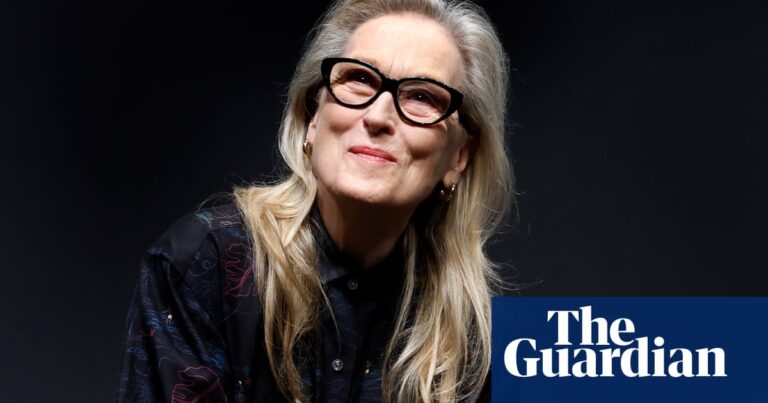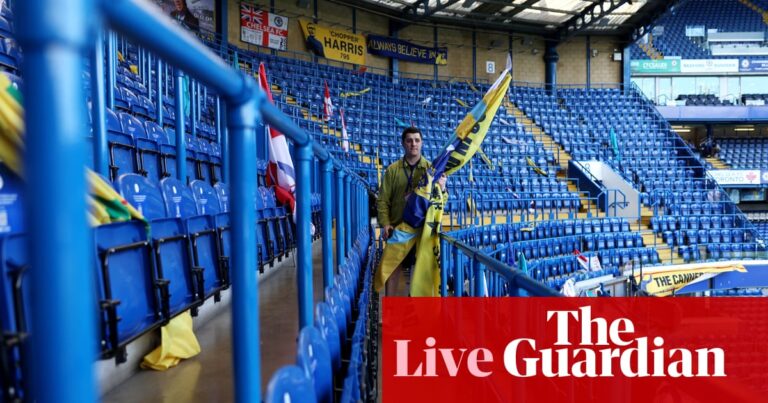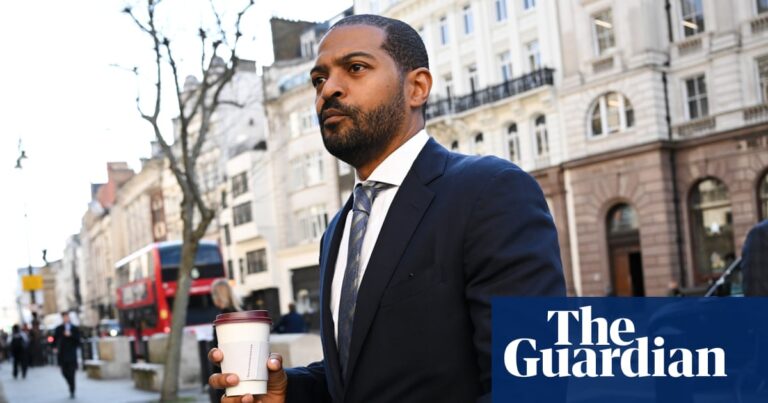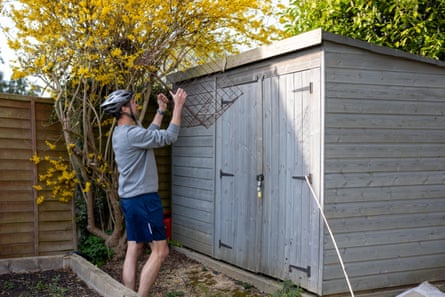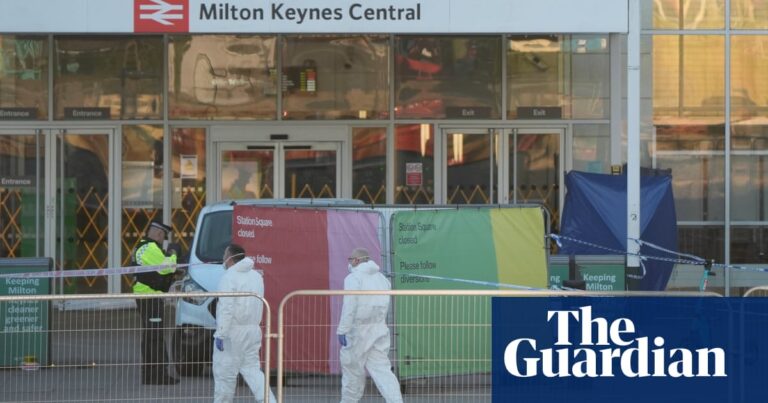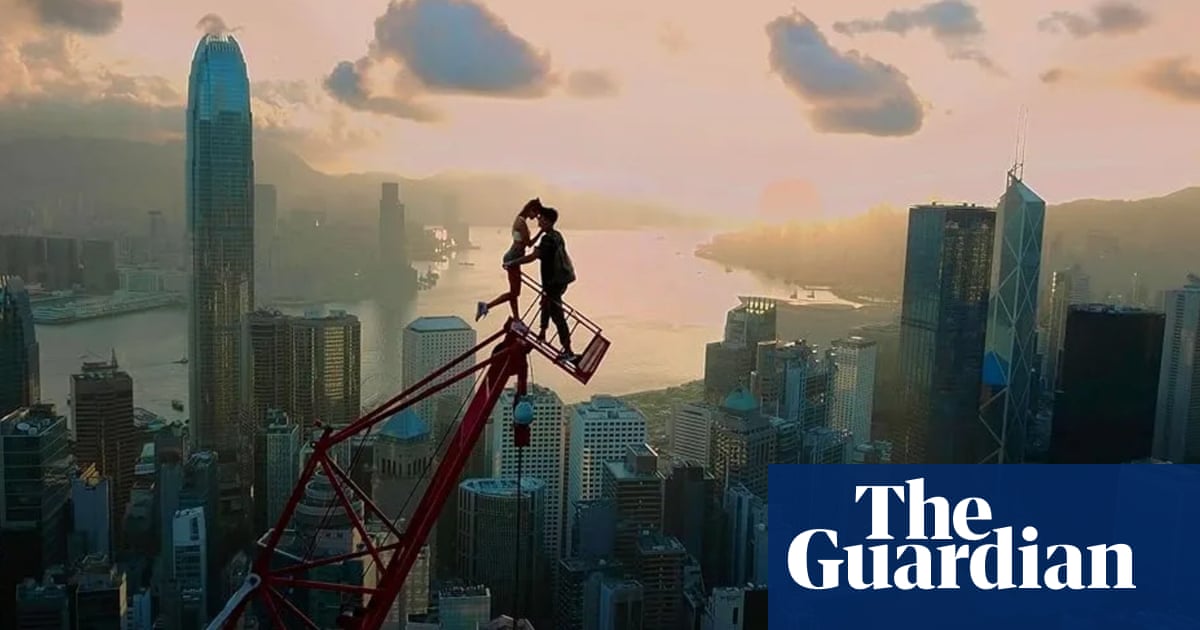
A
A recent movie about the daring and illegal stunts of two well-known “rooftoppers” made its debut at the Sundance film festival. It has received praise from critics and been compared to the award-winning documentary Free Solo about climber Alex Honnold, and Man on Wire, which was a success at Sundance 16 years ago and focused on urban tightrope walker Philippe Petit.
The film, Skywalkers: A Love Story, premiered at the Utah film festival on Thursday evening. It tells the story of a Russian couple, Angela Nikolau and Vanya Kuznetsov (also known as Ivan Beerkus), who fall in love while illegally scaling tall buildings and recording their stunts for social media. The documentary begins during their highly publicized climb up Merdeka 118 in Kuala Lumpur, Malaysia, the world’s second-tallest building. This feat caused controversy as it took place during the 2022 World Cup final and Malaysian authorities launched an investigation due to the tight security at the building’s construction site.
Filmed over six years in six different countries, Skywalkers, from the directors Jeff Zimbalist and Maria Bukhonina, traces the duo’s entry into the controversial sport of “rooftopping” – in which climbers scale buildings, spires, cranes or other man-made structures without safety harnesses – separately in Russia, and then together, as well as the factors, including social media crackdowns in Russia and the invasion of Ukraine, that drove them to illegally climb Merdeka.
Beerkus, an accomplished climber and cameraman, gained popularity on social media for his daring rooftop selfies, with only the vast distance below him and the camera in front of him; his content attracted sponsors who supported more daring endeavors and higher altitudes across the globe. Nikolau, whose parents were circus performers, spent her childhood in Kostroma, Russia, living with her grandmother after her father left and her mother struggled with severe depression. She turned to rooftopping as a way to leave a lasting impact and find solace, gaining a following for her acrobatic poses on the edges of buildings.
Each of them managed to make a living through the risky and thrilling sport. In one scene, Nikolau discovers that her former rooftop team in Moscow has passed away from fatal falls. As a couple, they earned more money by sharing their love story and taking photos of themselves kissing at great heights, conquering a variety of well-known structures.
The movie depicts the activity of rooftopping, also known as “skywalking” to the couple, as a symbol of trust in a romantic relationship. This is a difficult concept for Nikolau, who believes in relying only on oneself. The film portrays their rooftop adventures as a type of heist, where they must avoid getting caught by authorities. The couple has various tactics for deceiving, trespassing, and disguising themselves. When they are caught climbing a cathedral in Paris, Beerkus claims they are just artists filming the city from above. They pride themselves on doing “clean work” and argue that rooftopping should be seen as an art and a sport rather than just a risky activity. Nikolau even quotes an old circus saying to justify their daring stunts: “Our full potential is on the other side of fear.”
At one point, she asserts that it is not a dependency on adrenaline, but rather a dedication to personal development.
Skywalkers also explores the financial pressures that contributed to the couple’s increasingly risky stunts, culminating in a planned acrobatic feat atop Merdeka. The film’s logline bills this as a way to save both their careers and their relationship. Prior to the pandemic, the couple relied on sponsorships from Instagram to fund their travels, equipment, and other expenses in exchange for their death-defying videos. However, when Covid hit, this source of income dried up and Nikolau had to turn to modeling and creating sponsored content on social media to make ends meet. The conflict in Ukraine further reduced their income due to social media and censorship restrictions in Russia, leaving them with limited options besides taking office jobs (Beerkus’s parents pushed him to work in a family friend’s “trading” job, but he refused). As a last resort, the couple turned to selling non-fungible tokens (NFTs) of their stunt footage in order to make a living. According to her Instagram, Nikolau also creates paintings using materials from sex toys.
According to Nikolau, the summit of Merdeka tower is considered a “virgin tower” since it had never been scaled before. Two groups were arrested during their journey to the tower before attempting the climb. The goal of this climb is to earn money in a new and unpredictable field. Beerkus reveals that they used all of their funds to travel to Bangkok, Thailand, which has less strict laws compared to Malaysia where they trained for several months. The final part of the documentary has a similar feel to a heist movie, as the two carefully plan out their climb using various sources, building blueprints, hired drones, and practice their acrobatic skills, with Beerkus lifting Nikolau above his head while she stretches out her limbs, in order to reach the top of the spire.
The making of the movie and its dangerous nature brings to mind Free Solo, where directors Jimmy Chin and Elizabeth Chai Vasarhelyi grappled with the moral dilemma of potentially capturing Honnold’s death as he scaled El Capitan in Yosemite without any safety equipment. Free Solo received praise when it debuted at the 2018 Telluride and Toronto film festivals, and ultimately won the Academy Award for best documentary.
The movie is currently looking for a distributor at Sundance.
Source: theguardian.com










